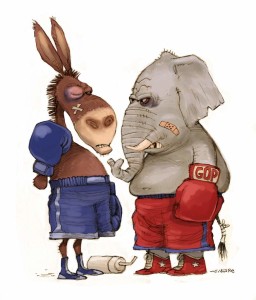A Less Divided Government?
 The historic victories for Republican candidates in the midterm elections on November 2, 2010 swept away the Democratic domination of Washington and ushered the country into another era of divided government. The last few instances the United States has witnessed this outcome, its politics has been defined by partisan squabbles, gridlock, and even a governmental shutdown. This time, however, has the potential to be different.
The historic victories for Republican candidates in the midterm elections on November 2, 2010 swept away the Democratic domination of Washington and ushered the country into another era of divided government. The last few instances the United States has witnessed this outcome, its politics has been defined by partisan squabbles, gridlock, and even a governmental shutdown. This time, however, has the potential to be different.
Unlike the 1990s, when social conservatives helped propel the GOP to power, and the 2000s, when Republicans and Democrats battled over national security and Iraq, the most pressing issue of today is indisputably the economy. Almost universally, congressional Republicans ran first and foremost on a platform of maintaining the Bush tax cuts and limiting government spending. In a departure from previous elections, issues like abortion, gay marriage, and even the wars in Afghanistan and Iraq were either entirely ignored or significantly, placed on the back burner.
This is largely as a result of an economy and debt that are historically weak and large, respectively. But the prominence of these issues could have unintentional positive effects on American political discourse. Cultural issues and war can involve deep morality judgments, and evaluating whether or not a given social or military policy is in the best interest of the country is often subjective. But with regard to the economy, the picture becomes fundamentally objective.
Of course economics can be more an art than a science, and there are certainly always debates amongst economists as to which policies will be most beneficial. But the fact that solving today’s problems will largely require considering numeric values rather than moral ones should, at least in theory, make it easier for both parties to work in a bipartisan manner without getting stuck in impossible-to-resolve quagmires.
Whether or not this trend is permanent is up for debate. When, over the summer, Indiana Governor Mitch Daniels, a possible 2012 GOP Presidential hopeful, called for a “truce” on social issues in order to direct full attention to fiscal matters, he was vilified by many in his party. In two years, the Republican presidential primaries will likely involve candidates pandering to the religious right, which makes the current opportunity to work together on economic issues that much more urgent.
Fulfilling this goal will undoubtedly require restraint from both parties. Democrats might be well served to hold back on issues like “Don’t Ask, Don’t Tell” and immigration reform. Republicans have often criticized President Obama for concentrating on universal health care in a time of economic distress. By attempting to repeal it now, they would be guilty of a similar neglect of pressing economic issues.
Finding ways to jump-start the economy and creating a plan to eventually reduce the deficit should consume most of the incoming Congress’s time and energy. Significant efforts to push forward on other issues would not only be unwise, but also fruitless, as the now-divided government will make it difficult to pass through legislation dealing with some of the previously mentioned, morally divisive topics.
The early signs from both parties suggest that such a compromise will be unlikely. Mitch McConnell, the GOP Senate Minority Leader, recently stated in an interview with the National Journal that “the single most important thing we want to achieve is for President Obama to be a one-term president”. Nancy Pelosi, the wildly unpopular and left-wing former House Speaker, has announced that she will seek the Minority Leader spot in Congress’s lower body. Developments like these don’t engender optimism. But if there were ever a time to find common ground, it is now.
The United States needs to boost economic demand in order to see short-term increases in our growth and employment. In the long-term, we need to increase revenues and reform entitlement programs like Medicare and Social Security to reduce the budget deficit. Unlike the morally ambiguous issues of the recent past, today’s problems have significantly more well-defined solutions. My hope, however fanciful, is that we will finally have the political climate that allows us to efficiently and effectively pursue them.